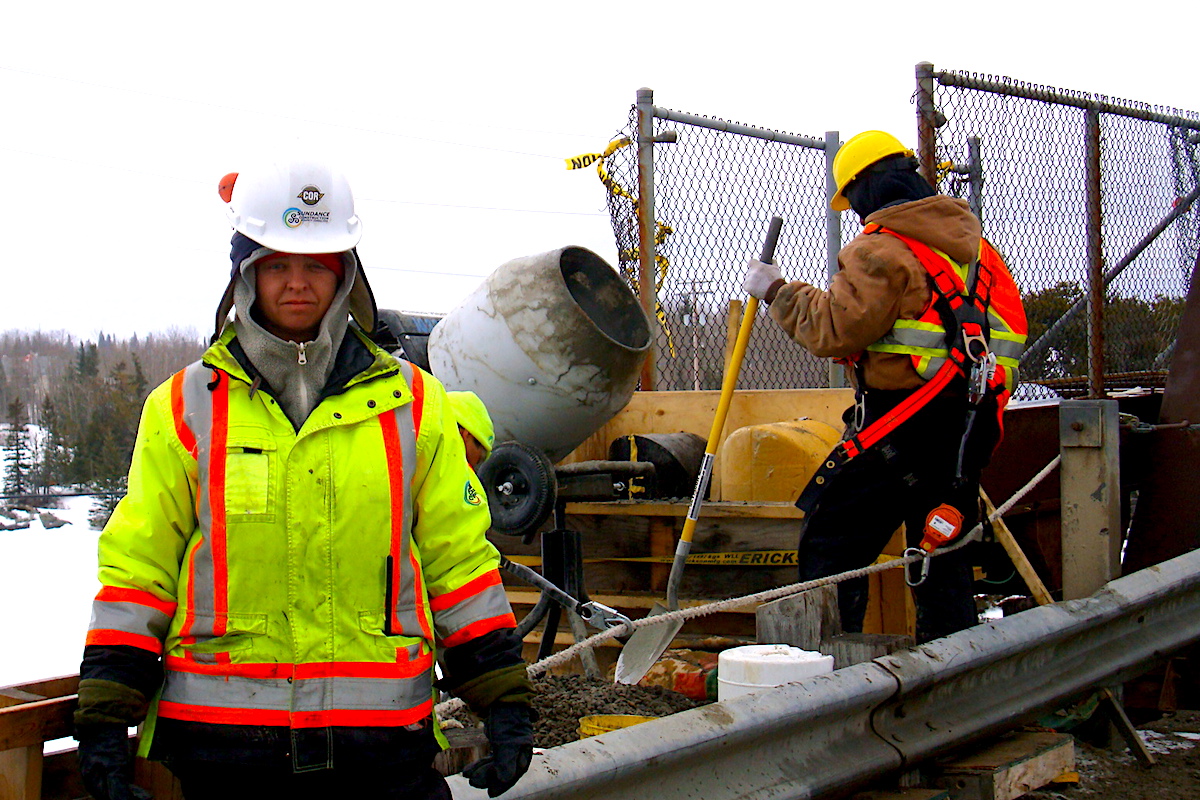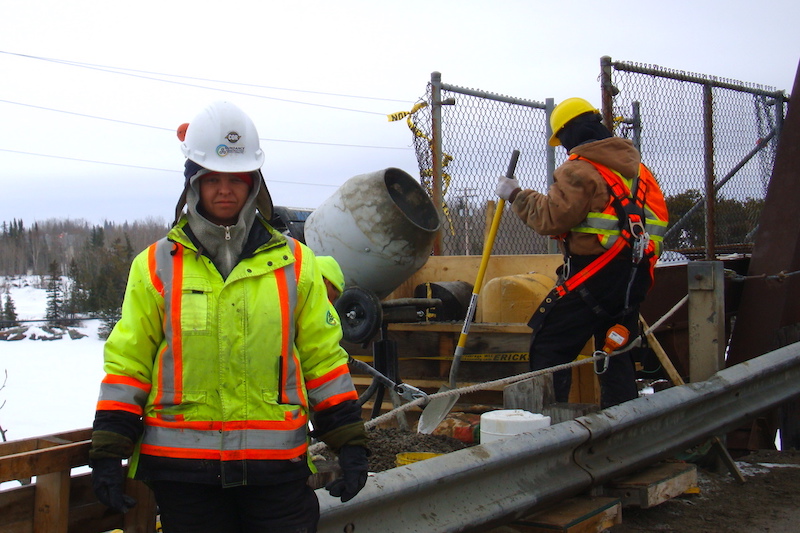Canada
I Run a Family-Owned Construction Firm. Here’s What COVID-19 Did to My World
Our business model is simple: We build and fix things so that other people have a place to live and work, and so that we can pay our own bills and live our own lives.

When a crisis hits, sometimes just a day or two can feel like a lifetime for a small business owner. That’s how it felt for me when much of the Canadian economy went on lockdown in mid-March. My business is construction. It’s not something you can do over a Zoom videoconference or text chat. And the challenges I’m now facing are similar to those faced by other small, family-owned and -operated businesses everywhere.
Even prior to the pandemic, my life was a hectic one. It wasn’t unusual for workdays to start at 6.30am, with me in the office laying out the work plan for the day with our foremen, and walking the tightrope we call cash flow. On any given day, I have at least two or three job estimates on my desk that need to be completed—plus accounting, payroll, project-management issues, client meetings, calls, and trips to jobsites to sort out the inevitable building and design issues. I also have to spend time chasing down the receivables.
All of this was before COVID-19 hit.
My men roam almost the entire province of Manitoba. We take the work as it comes, and that means I could have less than a day’s notice that they’re being shipped to a remote jobsite to work on, say, electrical or mechanical systems. There are a few rural communities where we respond to needs on an emergency basis, and we do subcontract work for water and sewer systems. My other crews do residential and commercial construction work. Sometimes I have them putting up a building; or repairing roofs and performing other renovations. The work they do is dirty, dusty, and sometimes dangerous.
Our clients range—at this point in the economic contraction, ranged might be a better word—from government agencies such as Health Canada, to First Nations, to northern Métis communities, to municipalities, to community organizations, and ordinary residential and commercial clients from every background.
As with many small businesses, our fortunes can fluctuate based on factors that lie outside our control. For instance, our firm was almost crushed in 2016 when the province of Manitoba halted contract payments following a project going sideways. In another case, the federal government allowed a general contractor to avoid paying subcontractors (including us) on a bonded and insured First Nations project. The legal fight to recover those funds wiped out any cushion that we’d accumulated for retirement and a rainy day.
COVID-19 now has given us several weeks of rainy days, with many more to come.
Even before the World Health Organization formally declared this to be a global pandemic on March 11th, and the first cases started appearing in Manitoba, I scrambled to prepare. I needed to ensure that we had sufficient cash flow because without that, nothing is possible. I knew where my budget was at, and what bills were essential to cover. But I also needed to find out from my key guys: How much did they need to survive economically for the next weeks? We were talking about the bare minimum to pay their own essential bills.
As any small business owner knows, there are costs that you have to pay regardless of whether or not there’s work. For us, that includes a bank loan that’s killing us, vehicle loans and insurance, employee health benefits, commercial general liability insurance, workers compensation premiums, utilities, and mortgage payments. Before I fuel up a single truck, cut a single paycheck or buy a single pallet of materials, I need CAD$8,134 (about US$5,800) just to pay these costs.
If our firm weren’t family-owned and closely knit, maybe I could just lay everyone off and hope for the best. But I can’t do that—and not just for humanitarian reasons. My business relies on skilled workers. And if my guys don’t have enough to pay the rent, it will impact my business and family in the long run.
So I’m trying to find a solution. I’m not sleeping, and when no one is around, I feel like I’m going to fall apart. I pull myself together, and chastise myself for being a crybaby, and get back to work figuring this out.
In the brief window we had before things shut down, the guys and I decided to hammer through as much of our existing work as possible in the short term, to get our billings out, and get money set aside. It was all hands on deck during that period. In the background, I took basic steps to make sure that I had enough food, water, and supplies here for 14 days for each one of my men. (Remember that this was a period when people were fighting over toilet paper. No one knew if store shelves would soon be empty.) If they were going to go all in, to get us our needed cash flow, I was going to make sure they were protected, too.
We also needed to secure the materials we needed for our jobs right away, since no one knew what supply chains were going to seize up. This approach was risky, because if we didn’t get paid, I’d be out of pocket for all this, with no cash flow.
On top of all these responsibilities, many small business owners also face an additional layer of regulatory control, depending on their trade. As an NCSO—a nationally certified construction safety officer—I had to be mindful of the health and wellness of my co-workers, some of whom are also my family. Our office and shop is literally a part of our home. As with old-fashioned store-front operations, our office occupies the main floor, and we live upstairs. Even in the best of times, this blurring of home and office can be challenging. But when a pandemic strikes, it becomes much more complicated—especially since I happen to have a compromised immune system at the moment.
So I implemented a “wellness” routine. In March, I bought additional masks. I spent much more than I should have. But I just decided the hell with it. I’ll pay the power bill next month.

It didn’t take long for one of the wheels to fall off. As part of our accelerated workflow, we were trying to finish work on a home in which the client was still resident. This client traveled to Ottawa as part of a delegation shortly before the pandemic was declared, then arrived back and got placed in self-isolation for 14 days. In an instant, we lost our jobsite. None of my men got sick. But we ended up running around frantically prior to the resident’s arrival, grabbing whatever essential tools we could before evacuating the premises.
The two guys on site were my primary supervisor and one of my brothers. On one hand, I had to cope economically with a lost jobsite, lost cash flow, and stranded materials. On the other hand, the potential exposure of people whom I love and care about came crashing down on me. I was angry at myself for having men in harm’s way, and even more angry for the circumstances that put us here. If the governments hadn’t shortchanged us on some of those former projects in northern Manitoba, I’d have had more cash flow and more decision-making flexibility.
I pulled it together and got the men moved into an empty home within the First Nations community where the work was taking place. As we were struggling to figure out what was next, the First Nations staff scrambled to find us a replacement project, along with the associated funding. To their credit, the Chief and Council managed to pull that one out of the fire.
For the guys working urban areas in the south of the province, the focus is finding isolated commercial job sites with limited personal contact. But blocking potential exposure entirely is impossible, especially since some infected individuals are asymptomatic. Working on residences where older people live is especially sensitive. And it’s not like we ourselves are all in the bloom of youth. My husband, who is 59 and our primary electrical guru, has become understandably apprehensive about where he works.
Three days after the pandemic was announced, my suppliers sent out emails detailing their own new policies. The lumber yards asked us to phone in our orders ahead of time and pay electronically in order to minimize any personal contact. Other simply shut their doors.
On a positive note, we received a progress payment on an ongoing northern project, which allowed me to top up our guys’ bank accounts. I made sure that everyone knew that this was the last time I would have certainty about payroll.
I’m a business owner, mother, wife. I’ve taught survival courses and served in the Canadian Armed Forces. So I’m not sentimental or naïve. But the heart-wrenching decisions I’ve been faced with do take a toll, especially when they involve family. Four days after the pandemic was declared, we got an opportunity to send our guys into a northern Manitoba location to set up a construction camp, including electrical. It’s good money, and could allow us to pay the bills for another 30 days. But it also meant sending my son and husband to a location without immediate access to health services. I put together first-aid supplies, immune-system boosters, masks, and food. Then they left, traveling on a small plane. It’s the only way in and out. I was hoping for a charter flight. But that did not pan out.
They’d be working on a far-flung First Nation. This may sound reassuring, as these communities are insulated by geography. But First Nations leaders travel all over the country, often to meet government officials or as part of their work on delegations. On a per-capita basis, they probably have more interactions with Ottawa-based frequent fliers than almost any other demographic in our country.
Like every business owner, I’ve closely followed government pronouncements about what “essential services” will be allowed to operate—an economic life-or-death decision for many of us. What makes you feel helpless is the fact that even if your industry is permitted to operate, you may still end up being affected by someone else getting shut down. For instance, courts are mostly shuttered right now. So we have no idea when our next legal hearings will take place, which means we have no idea when we will get money owed to us by the government.
Moreover, road closures to “outsiders” in rural communities have meant that we couldn’t bring in needed supplies. On one hand, I’m sympathetic to the need to protect these isolated areas. But with the winter roads being closed down until next winter on March 31st, these closures meant blocking supplies that were supposed to stock inventories until the winter roads resume operation in late 2020. (One of the ironies of the rugged Canadian outback is that travel is often easier when temperatures are frigid, because the ice and snow are easier to traverse than flooded rivers and swampy marshland.)
And to top things off, my doctor called to let me know that my CA-125 cancer antigen levels were elevated, with a tumor on one ovary and another “mass” within my pelvic area. We discussed follow-up diagnostic testing in May, and what the process would be once we got to surgery. COVID-19 is putting additional strains on the health system. And although I am likely a stage two ovarian cancer patient, it was going to be months before the health authorities in Manitoba had the diagnostic results they needed.

That wasn’t an easy conversation to have with my son and husband while they were out working remotely. We’d known since January that something was not quite right, and that it had nothing to do with business stress. This was not a great time to get confirmation.
Shortly after that, our office and yard site became a closed work site. Staff come in through the back door only, and others come in through the front by appointment. We are cleaning all the time. I’m also trying to take care of myself as much as possible—including getting what fresh foods I can and doing exercise.
In recent days, I’ve watched the response from the federal and provincial governments. There’s a wage subsidy program, but it could put us on the hook for corporate taxes down the road. We did manage to secure a deferral on our bank loans, however. And our credit union responded to our request for a mortgage deferral in three hours—with a yes, but also a penalty free. The Women’s Enterprise Center of Manitoba actually called us, and asked if we wanted to defer an April 15th loan payment. However, we need more direct support from government to help us keep the doors open. New programs are being rolled out. But experience has taught me that these systems usually are gamed against small business owners.
Our new normal is that nothing is normal. I have no idea how long I can continue to make payroll, or how I will keep my guys paying their own bills. A few days ago, when my brother came down with flu-like symptoms, I thought it was all going to crash down on us. He’s better now. But without access to COVID-19 testing, he can no longer have access to the office, or anyone that enters it on a regular basis.
Our business model is simple: We build and fix things so that other people have a place to live and work, and so that we can pay our own bills and live our own lives. Doing this has become a complicated daily struggle that sometimes feels like it will break me and my family. I go through every day in a spirit of grief, anger, and, in some moments, hopelessness.






